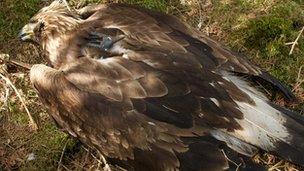Gamekeepers reject claims eagle died due to trap
- Published

The dead eagle was found with broken legs under a tree near a lay-by in Aberdeenshire
Claims that a golden eagle found dead in Deeside in May 2012 was left to die after being injured in a trap have been rejected by gamekeepers.
The Scottish Gamekeepers Association (SGA) said there had been "irregularities" in RSPB Scotland's interpretation of the incident.
They also said there was no evidence to support the claim that the eagle had been injured in Angus and then moved.
The RSPB have described the SGA's report as defending the indefensible.
On 5 May last year, the eagle, which had been fitted with a transmitter, was found dead by the roadside; its legs were broken and its wings folded.
In September last year the charity said the bird had suffered two broken legs due to trauma "that could be consistent with an injury caused by a spring type trap" and that the severity of these injuries "would prevent the bird from being able to take off".
They also suggested that transmitter data showed the eagle had then been moved from the Angus Glens, where they claimed it had been trapped, to a tree close to a lay-by on a quiet country road near Aboyne on Deeside.
Improbable events
It offered a £1,000 reward for information leading to a successful prosecution in the case.
However, the SGA investigation has questioned RSPB Scotland's version of events.
A spokesman for the Scottish Gamekeepers Association said: "By gathering detailed knowledge from those conversant with the operation and strength of the traps suggested, our report describes this assertion as 'highly improbable'.
"Similarly, a lack of substantive evidence was found to back RSPB claims the bird had been moved and left to die under a tree where it suffered a 'lingering death'."
The association said police did not find evidence to support the charity's theory and a report by a vet suggested that the injuries were only "consistent" with those which might have been caught in a trap.
Tackling abuse
Its report has now been sent to the Minister for Environment and Climate Change Paul Wheelhouse, Tayside and Grampian Police and the RSPB.
The SGA spokesman said: "The SGA has worked extremely hard as an active partner in Partnership for Action Against Wildlife Crime (PAW) and is proud of the dramatic fall in the number of bird of prey abuse cases in Scotland- a trend set to be further cemented next month when the 2012 figures are published."
However, the SGA criticised RSPB Scotland for taking the case to the media four months after the eagle was found, despite the investigation into the bird's death still being live.
"If it is found that no evidence of wrong-doing is established in this case, and because of the unverified claims reported by the RSPB to the media, the SGA feels it is important to call into question whether it is appropriate that any singular organisation, with a clear political agenda should be privy to such sensitive evidence under the guise of expert witnesses in crime cases.
"To be able to use privileged information in order to make damaging media statements against a profession raises serious questions about fairness of process, particularly if police have found no clear evidence of criminality."
Unfair process
He added: "It is the view of the SGA that those called in to assist police in wildlife crime investigations should be held accountable for the information they are privy to, as impartial bodies.
"We feel it is also important the general public are made aware of how unfairly the process currently operates in Scotland, in this regard. At the moment, when a suspected wildlife crime is reported, police carry out the investigation using various experts for issues such as the identification of species.
"The Scottish people are entitled to ask whether they feel it is right that 'experts' should then publish personal interpretations which may prejudice future court proceedings or, indeed, prejudice the public against what could be innocent parties."
The RSPB has rejected the findings of the SGA, describing it as "a rather desperate statement".
No excuses
Duncan Orr-Ewing, head of species and land management at RSPB Scotland, said: "It calls into question their very commitment to the aims and objectives of the Partnership for Action Against Wildlife Crime Scotland (PAWS).
"The illegal killing of golden eagles in Scotland is still a serious conservation issue, undermining the health of their population, and bringing international shame to our country.
"Rather than seeking excuses, we believe that the Scottish Gamekeepers Association's efforts would be better directed at tackling those within their sector who still encourage such outdated practices".
- Published24 September 2012
- Published21 September 2012
- Published7 September 2012
- Published27 June 2012
- Published8 June 2012